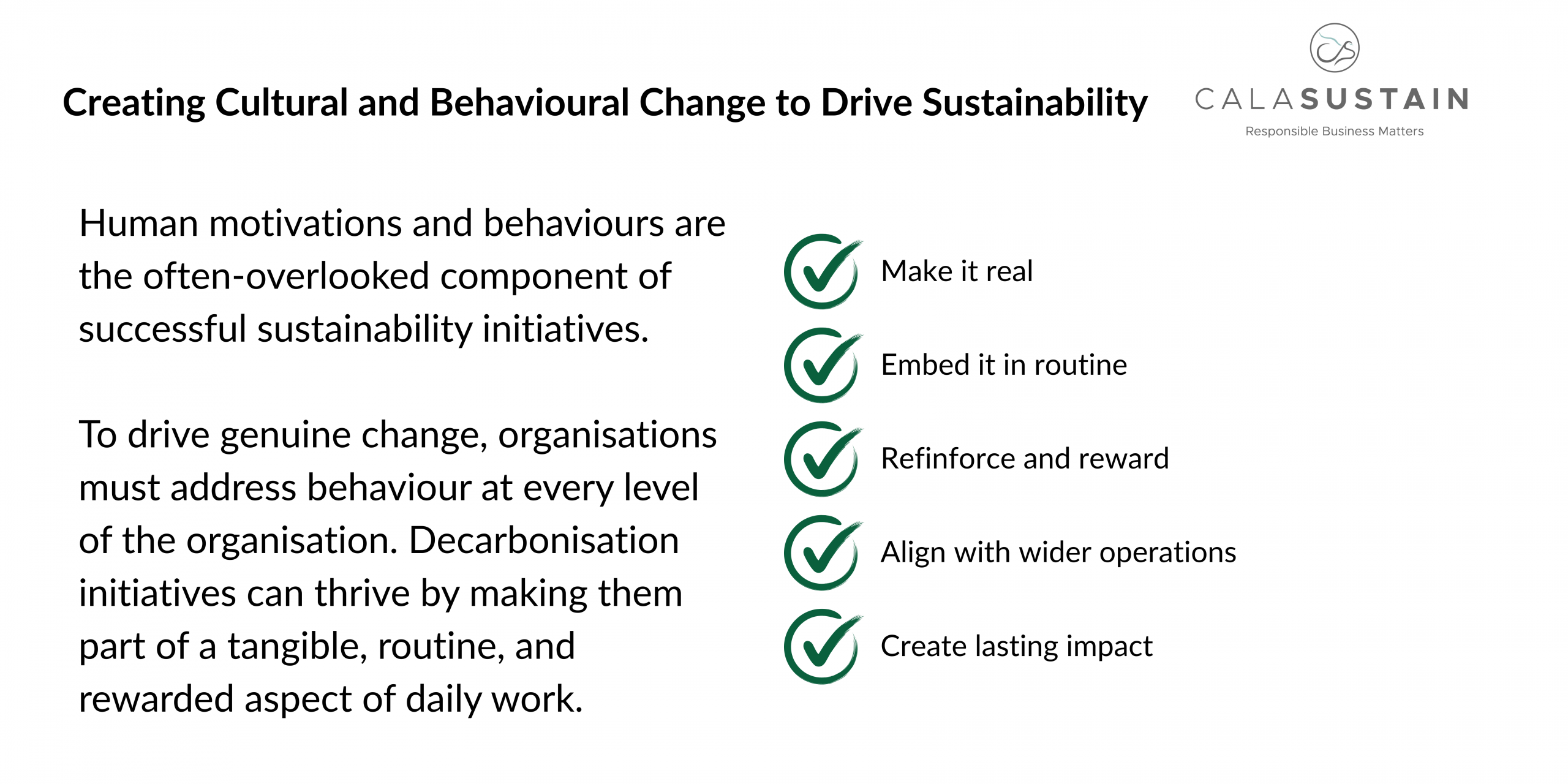
Why your carbon reduction initiative needs cultural and behavioural change to succeed
The human factor in decarbonisation
Organisational change programs frequently focus on new technologies, policies, or infrastructure. This focus can neglect the cultural and behavioural shifts essential for lasting success. When sustainability is embedded into the routines and mindsets of employees, even the boldest decarbonisation initiatives will succeed.
To drive genuine change, organisations must address behaviour at every level and make decarbonisation a tangible, routine and rewarded aspect of daily work. Achieving real and lasting impact requires following four golden rules for changing human behaviour:
1. Make it real
Decarbonisation goals are easy to agree on in boardrooms but challenging to implement in break rooms. Success requires translating policies into actionable tasks. For example:
- Devolve sustainability targets along the same boundary lines as existing financial budgets to ensure accountability.
- Provide tools that help employees make low-carbon decisions through carbon accounting platforms designed to work in the organisational context.
- Focus efforts on impactful areas—prioritising large emissions reductions over symbolic but minor actions.
When employees see how sustainability can integrate with their role and their existing practices, they are more likely to adopt and champion it.
2. Embed it in routine
Humans thrive on routine, so sustainability must become an organisational habit. Focus on embedding decarbonisation into key workflows and decision gates.
Our work redesigning Defence procurement to embed sustainability is a good example. We identified that Defence equipment has thousands of processes it must go through across its lifecycle from idea to disposal. However, there are a few key decision gates that can be targeted to have the greatest impact. This, leads to significant sustainability gains.
3. Reinforce and reward
It is essential to create an environment that supports and celebrates sustainable behaviours. Start by identifying barriers that might hinder sustainable practices.
- Ensure workflows are optimised to reduce waste and energy use.
- Ensure tools are available to enable sustainable behaviours, such as remote work and virtual meetings instead of frequent travel.
- Celebrate the small wins to build momentum. Highlight achievements like departmental carbon reductions or individual initiatives.
In a recent consulting engagement, we found that an awards ceremony where the prizes were branded mugs identifying the owner as a ‘green champion’ created a real culture of kudos amongst the team. If the reward is visible and linked clearly to the decarbonisation goal, then the organisation can reward and reinforce appropriate behaviours.
4. Align with wider operations
Sustainability goals must align with broader organisational priorities and they must be integrated into the systems, processes and ways of working of wider operations.
- Take a systematic top-down look at workflows, decision-making frameworks and organisational structures to ensure that the whole organisation is aligned to the decarbonisation outcome.
- Start with the leadership team – get leaders to truly commit to the decarbonisation programme and its implications, and then model and communicate that to the wider organisation.
When sustainability becomes a shared enterprise priority, it transitions from rhetoric to reality.

Lasting impact
Carbon reduction efforts will only thrive alongside cultural and behavioural transformation. By embedding decarbonisation into everyday practices and fostering a culture of sustainability, organisations can achieve enduring success.
This requires determination, focus, and systematic integration – but the rewards, both for the planet and the organisation, make it a vital pursuit. Sustainability is more than a goal; it’s a way of working, thinking, and thriving, and like your new year resolutions, it needs focus and determination to truly land into organisational habit.
Check out our groundbreaking initiative to decarbonise UK defence equipment. We are helping the Ministry of Defence (MoD) achieve its Net Zero commitments.

